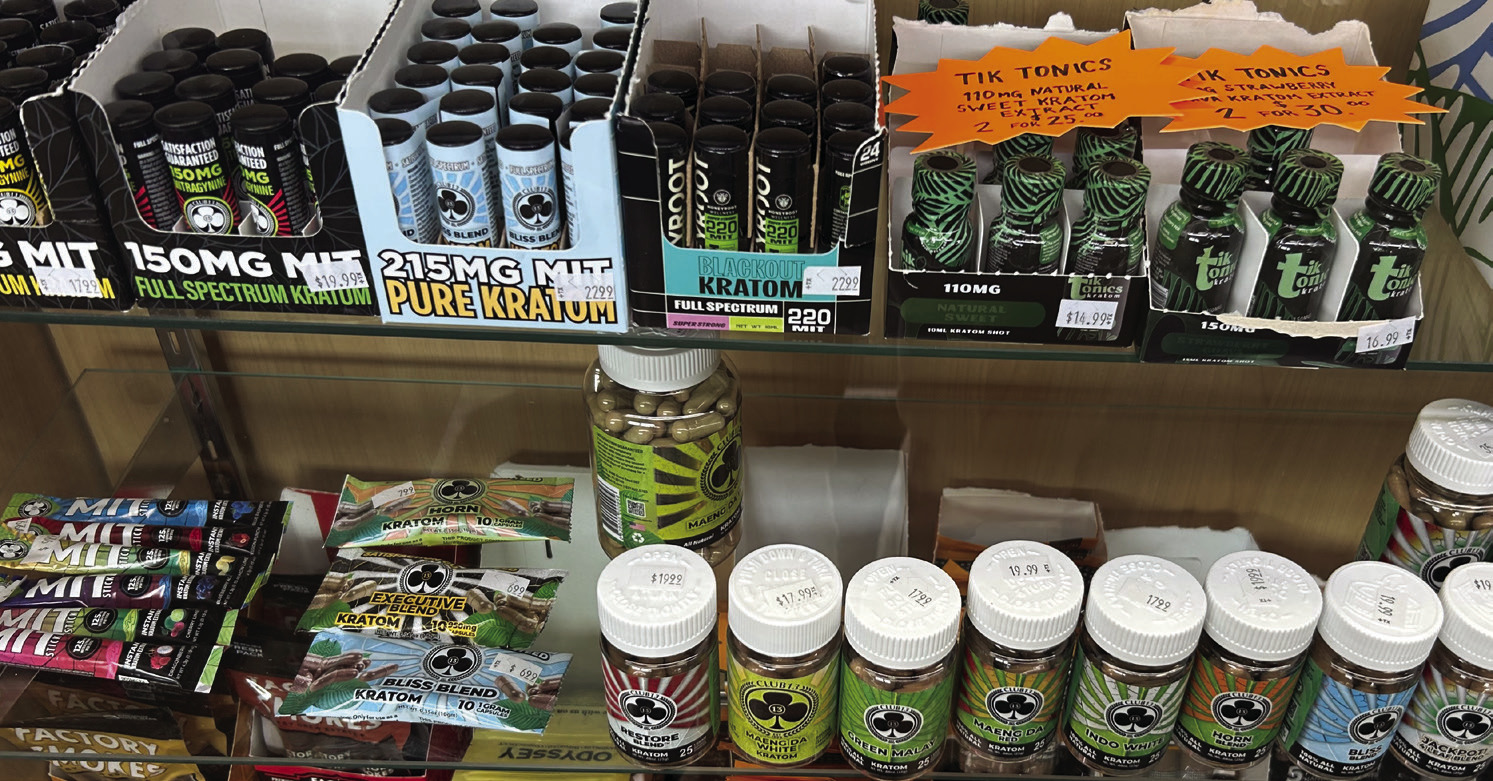Chad White was Lisa Garner’s first-born child, born in Macomb on June 25, 1990. A 2008 West Prairie graduate, White was a kind and sensitive young man known for his quirky sense of humor and deep care for others. His life was heartbreakingly cut short one year ago, on Aug. 2, 2024, from a “natural substance” he believed was safe. Since then, Garner has shared her family’s tragedy widely, hoping to educate others about the dangers of Kratom.
“Chad was a wonderful son, a devoted big brother, and a loving husband and father,” Garner told the Community News Brief. “He left an impression on everyone who knew him, quick to reach out with kindness so no one ever felt alone. I’ve received numerous memories from friends from high school and beyond, as well as his cousins, all sharing how much of an impact he made on their lives. As a father, he adored his two little girls, his six-year-old stepdaughter and his four-year-old biological daughter. He loved them with his whole heart.”
More than a decade ago, before her son became a family man, Garner said he was introduced to OxyContin by a “so-called friend” who gave him the painkiller to help with depression after a recent breakup. That moment marked the start of White’s battle with addiction.
“When OxyContin became too expensive and hard to get, like many others, he turned to heroin. Those were dark days for our entire family,” she shared. “He went through many rehabs, but it wasn’t until he served time in jail and entered a recovery program through Paddy Court that things turned around.
“When he came out of jail, he was the best version of himself I had ever known: disciplined, responsible, creative and proud of the life he had rebuilt,” Garner explained. “He stayed clean from heroin for the remainder of his short life. He told me about four years ago that he didn’t even have cravings for it anymore.”
Garner said her son began taking Kratom about three years before his death. She sometimes picked it up for him from various vape shops, unaware of the dangers of this so-called natural substance, which is readily available over the counter at gas stations, convenience stores, and vape shops. At first, White took Kratom-based pills but later switched to a powdered form mixed with tea.
“I don’t know how much he was taking, but I do know he was using it more and more, revealing the unadvertised addictive qualities it holds,” she said. “His cause of death was a toxic level of mitragynine in his system. The only other medications present were Wellbutrin, which he took for depression, and gabapentin for anxiety, both at normal, prescribed levels by his doctor. He had exactly what he was supposed to have with those prescriptions; it was the Kratom that caused his death. According to professionals, the mitragynine in Kratom built up in his system until it became toxic, causing him to go into a seizure. He was gone instantly.”
On July 29, the U.S. Food and Drug Administration announced it was taking steps to protect Americans from dangerous, illegal opioids by recommending scheduling actions to control certain products such as Kratom under the Controlled Substances Act.
Kratom is a tropical tree native to Southeast Asia. Products made from Kratom leaves are used to self-treat conditions such as pain, coughing, diarrhea, anxiety and depression, opioid use disorder, and opioid withdrawal. An estimated 1.7 million Americans aged 12 and older used Kratom in 2021, according to the Substance Abuse and Mental Health Services Administration.
“I’m telling Chad’s story because I don’t want another family to go through what we’ve gone through. Kratom is marketed as a ‘natural’ product — safe, even healing — but that couldn’t be further from the truth. Kratom markets itself to those who suffer from addiction, from cravings, as the natural, organic answer to their issues. It promises those who suffer from anxiety relief from their troubled bodies,” Garner emphasized. “But in fact, it is the complete opposite. I call it a wolf in sheep’s clothing. It takes their cravings for other substances and replaces them with extreme cravings for Kratom. It takes their anxieties hostage, and the ransom is a life chained to its power until it takes their life. There are no regulations, no dosage limits, no warnings for this poison. It is sold over the counter in gas stations and vape shops, as if it is completely harmless. But it isn’t harmless; it is powerful and deadly. As my daughter, Chad’s sister Tiffany, stated, ‘Heroin didn’t kill him, but Kratom did.’”
Garner pointed out that her son, who lived with his family in Adams County, was almost 10 years clean from heroin and believed Kratom was helping with his anxiety. Instead, it silently built up in his system and took his life at age 34 while his daughters watched from only a few feet away and his father, Randy White, who had just stopped by for a quick visit, was there to catch him as he fell.
After White’s death, his mother began speaking out publicly to raise awareness about the dangers of Kratom. She first shared his story through social media, local news, and with anyone who would listen. Recently, she was contacted by the Daily Wire to film her story for a documentary about Kratom and its dangers.
“It wasn’t easy to talk about, but I knew if his story could save even one life, it was worth telling,” Garner stressed. “The Daily Wire’s goal is to give a voice to families like mine who have lost loved ones to this unregulated substance and to expose how something so dangerous is being sold so casually over the counter.”
Garner’s goal is to see Kratom taken off store shelves immediately or, at the very least, strict regulations put into place, including warning labels, dosage limits, and controls on how and where it can be purchased. She hopes lawmakers will recognize the danger and ban Kratom altogether.
To help make sense of her son’s senseless death, in addition to sharing her family’s story with news media and on social media, Garner is writing a book, *How Do I Go On — A Mother’s Journey through Love, Loss and Kratom’s Deadly Truth.* She said talking about him often keeps his memory alive.
“There’s no real healing from losing a child, you simply learn to carry the pain and find ways to keep going. Some days the weight of it feels unbearable, but what helps me is remembering Chad for who he truly was — his sensitive heart, his humor, the way he loved his daughters and the kindness he showed to everyone around him,” Garner said. “What I want people to know most is that Chad’s life mattered. He wasn’t just a ‘Kratom death.’ He was a son, a brother, a husband, a father, and a friend. He fought hard to overcome addiction and rebuild his life, and he was a decade clean from heroin when this so-called ‘natural’ product took everything away in an instant.
“Families like mine aren’t rare, we’re not alone. Yet most people, even many in the medical field, have never heard of it. That has to change. If telling Chad’s story can raise awareness, spark conversations, and push for regulation or even a ban, then maybe some good can come out of this heartbreak,” she concluded. “I hold onto the love we shared. That love didn’t end the day Chad died … it’s still with me, and it always will be.”
---
Kratom Effects & Risks
Source: mayoclinic.com
When used in low doses, Kratom acts as a stimulant. At higher doses, it can have a sedative effect. People who use Kratom to relax or be more social often believe it is natural and safe because it comes from a plant; however, the amount of the active ingredient in Kratom leaves can vary greatly, making it hard to predict the effects of a given dose.
Depending on the amount of active ingredient and the user’s health, taking Kratom can be harmful. There are too few studies to rate the claims about its benefits. The U.S. Food and Drug Administration (FDA) has warned people not to use Kratom because of possible harm.
Poison control centers in the U.S. received more than 3,400 reports about Kratom use from 2014 through 2019, including reports of death. Side effects reported include high blood pressure, confusion, and seizures.
Kratom can cause liver damage, muscle pain, delusions, depression, and trouble breathing, among other effects.
Studies so far have found many safety issues with Kratom. People who took it for more than six months reported withdrawal symptoms similar to opioid use, and users may begin craving it. Kratom products have also been found to contain heavy metals, such as lead, and harmful germs, such as salmonella.












